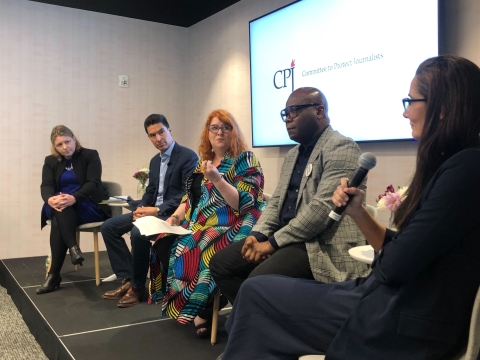
In Liberia, a country with a long and tragic history of violence against anyone who challenges power, guns did not silence journalist Rodney Sieh. Courts did.
Sieh was one of four journalists and legal experts on a World Press Freedom Day panel discussion at the Committee to Protect Journalists in New York about the growing use of “lawfare” to punish journalists and keep the truth hidden. Moderated by ICFJ Deputy Vice President for Global Research Julie Posetti, the panel explored how governments are becoming ever more sophisticated in using aspects of the law that seem to have nothing to do with journalism – tax issues, foreign funding, even protections for women – against journalists.
“It’s not just individual journalists paying the price of targeted persecution,” Posetti said. “When editors and news publishers are targeted, entire news organizations are imperiled. Outlets are shuttered and newsroom staff left unemployed, dealing a blow to independent journalism in countries in teetering democracies and burgeoning autocracies.”
Sieh was targeted because the media outlet he founded, FrontPage Africa, published the government’s own report about how a minister had misused donor funds. The minister was sacked and blamed Sieh. A corrupt court system (Sieh says he saw the minister and his lawyer “high-fiving” each other outside the judge’s office before the trial began) convicted Sieh, sentenced him to 5,000 years in prison, and closed FrontPage Africa.
In Guatemala, publisher and ICFJ Knight International Journalism Award winner José Rubén Zamora has been in prison for more than nine months on spurious money-laundering charges. His son, panelist José Zamora, said that governments have discovered that threatening journalists with violence (as happened to his father repeatedly) or trying to undermine them through defamation campaigns were not the best tactics. They made the journalists into heroes.
“They discovered the most effective tool they have in the journalism repression playbook is criminal law,” said Zamora, chief communications and impact officer at Exile Content Studio and a member of ICFJ’s board of directors. “It’s easy to fabricate a case saying that a journalist laundered money, arrest him and put him in prison.”
That strategy was one of many employed against Zamora’s father, who has faced 140 lawsuits as well as tax audits and campaigns to pressure businesses to stop advertising in his newspaper, elPeriódico. One congresswoman even used the country’s anti-femicide law to file lawsuits claiming Zamora and other journalists were persecuting her because of her gender, Zamora said.
In the wake of Zamora’s imprisonment, elPeriódico has ceased printing and operates online with a small fraction of its former staff, many of whom continue to be targeted. The government’s goal, José Zamora said, is threefold: “To punish my father directly, to shut down the newspaper, and to send a message to all journalists in Guatemala that journalism is a crime.”
Caoilfhionn Gallagher, an Irish lawyer who defends many prominent persecuted journalists and outlets, noted four trends increasingly employed by repressive governments:
- The growing use of “lawfare” – the weaponization of the law to target journalists and journalism. She noted that murdered journalist Daphne Caruana Galizia of Malta (a member of the European Union) was facing 46 lawsuits at the time of her death, and those suits remain active, with her children now the defendants.
- The direct targeting of media outlets, like elPeriódico and FrontPage Africa.
- The targeting of journalists not just for their work but for their character. They are being painted as “fraudsters not to be trusted.”
- Extending the persecution beyond national borders. “Iran has been using the long arm of the state to target journalists in the U.S., the UK, around the world,” she noted.
Posetti turned to Carolina Henriquez-Schmitz, director of TrustLaw at the Thomson Reuters Foundation, to talk about tactics for fighting these trends. She outlined important steps that journalists and the organizations that support them must take:
- Expand legal protections for journalists. That support shouldn’t come only after journalists are sued or imprisoned, she said. Lawyers also need to help media outlets avoid legal trouble by reviewing content before publication to minimize risks. (Reporters Shield, launched during World Press Freedom Day events in New York, is a new source of legal support.)
- Increase capacity among lawyers. They should be experts not only in obvious areas like libel law, but also in financial crimes, cyber crimes and other areas not obviously associated with journalism.
- Use strategic litigation to set stronger precedents. She cited an “anti LGBTQ+ law” currently being debated in Uganda. While it may seem unrelated to media freedom, she said, versions of the proposal could be used to prosecute journalists for “promoting” homosexuality.
- Confront abusers. Democratic governments and intergovernmental organizations need to “call out the abusers. We need people to be aware of this threat. We need to empower voters to understand this as a critical issue that affects their daily life.”
In Sieh’s case, confronting abusers is exactly what won his freedom. His imprisonment was widely condemned internationally, and he said the pressure caused Liberia’s then president to order the justice minister to free him. FrontPage Africa also is publishing once again.
“But I still paid a price. Every time I apply for a visa, I’m a criminal. If you Google my name, I’m a criminal,” he said. He added that his case “shows that the power of the media is strong, but at the same time these laws … are meant to keep us in fear. The guns … are silent now. They use the court system to prosecute journalism.”